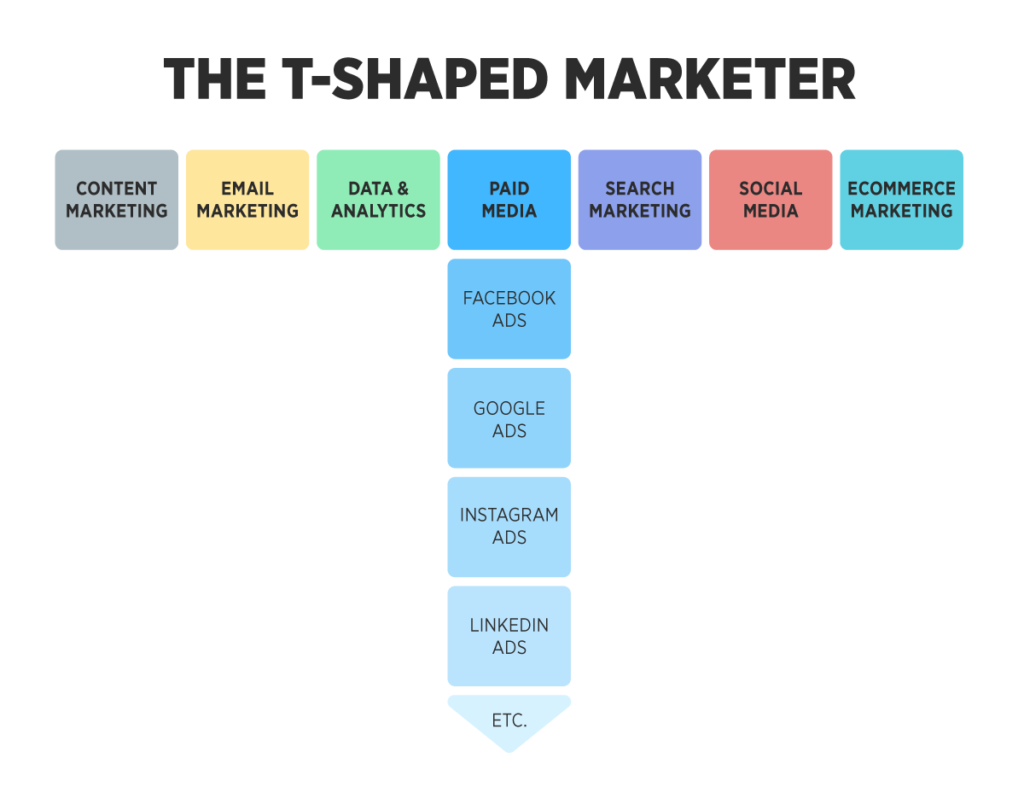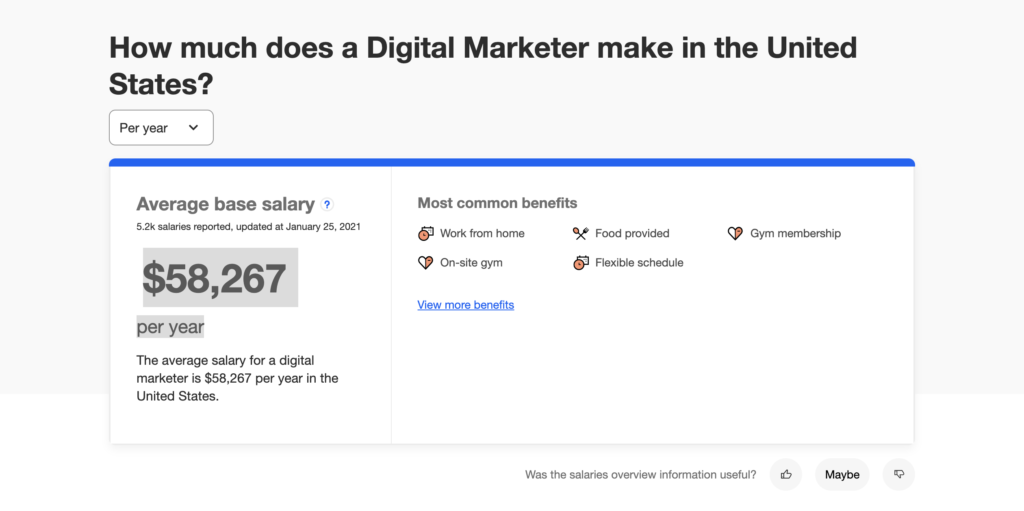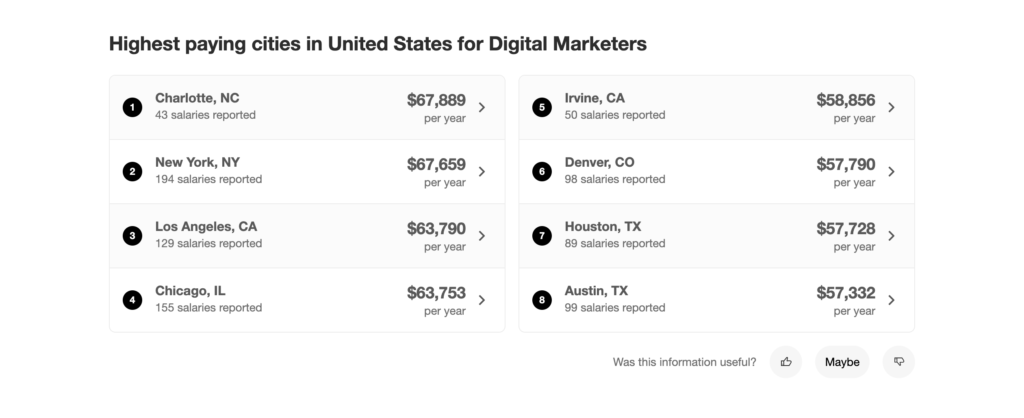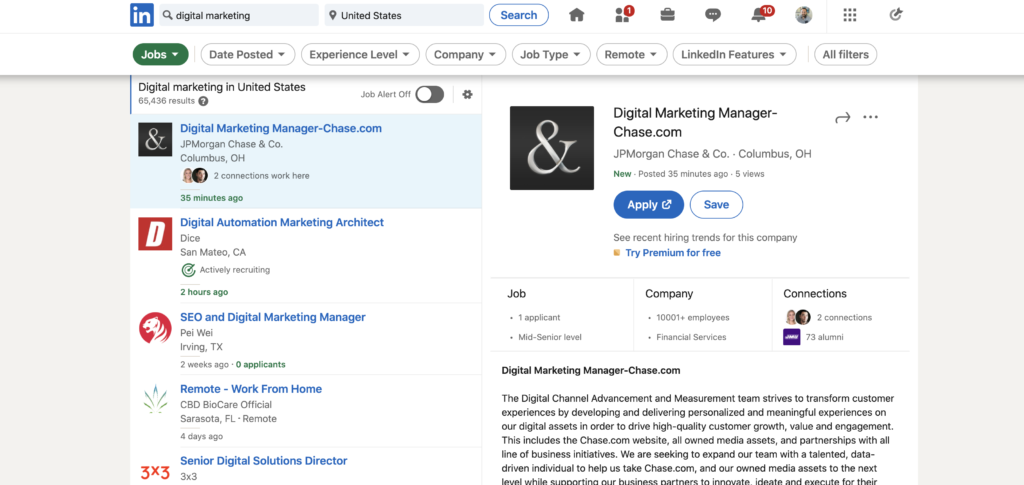As the internet as taken over more and more of our lives, businesses have increasingly realized that they need to have an online presence in order to continue staying in business. Even if your business requires being in person (which, by the way, way fewer do than we thought prior to March 2020 when the Covid-19 global pandemic hit the US), people are finding it online.
Along with that, a lot of businesses in the past year have gone more online due to the pandemic. Stores that previously could count on growing revenue each year because of their physical location were suddenly in the ecommerce game. Gyms that preached belonging and being part of an in-person tribe suddenly realized that they could teach even more people online and not have to have as big of a physical space in order to survive.
With this has come an increased need for great digital marketers and marketing talent, which means that the opportunity has never been greater if you’re looking to get a career in digital marketing that also allow you to make a great living and progress along a stable career path.

If you’re in the position where you either don’t like your current career path or need to find a new career path because of things outside your control (layoffs/global pandemic/etc), this article is for you.
In this guide to getting a career in digital marketing, we’re going to cover the following:
- Common types of digital marketing that people focus on
- The typical digital marketing career path
- How much digital marketers make
- Where to find a digital marketing job
Let’s get started
Common types of digital marketing that people focus on
If you’re thinking about getting a career in digital marketing, it is important that you understand how the types of digital marketing commonly break down so that you can choose the one that best fits you, your skillset, and your way of thinking.
Digital marketing is commonly broken down into a few areas:
- Acquisition
- Retention
Most digital marketers though would say that they focus primarily on acquisition. The vast majority of companies who are looking to be marketed online are looking for new customers, and usually leave retention up to product teams or software.
You should know though that there is a growing subset of digital marketers who are focusing on retention and expansion of accounts. These marketers usually focus on copywriting, email marketing, and SMS to drive results alongside customer success and product.
But back to the common types of digital marketing.
Assuming you’re focusing on acquisition marketing (which is different from brand marketing), it breaks down into two main areas:
- Organic
- Paid
Organic acquisition channels most commonly include:
- SEO (search engine optimization) which encompasses technical coding, content research and production, and outreach aka building backlinks back to a site,
- content marketing (sometimes for SEO, sometimes not), and
- organic social media management.
In addition to these major channels, there are a myriad of skillsets needed to properly execute on these channels. These include copywriting, messaging, coding, design, and even customer service chops (for social media management). If I had to label the skillsets needed for organic digital marketing, I’d say you have to have an eye for data and making decisions off data while also having empathy for the customer and what they’re looking for and where they are in their purchase funnel.
Paid acquisition channels include:
- SEM (search engine marketing) which mainly refers to Google Ads and Bing Ads,
- social media advertising on platforms like Facebook, Instagram, Pinterest, Quora, and more, and
- Display and native advertising, which is sometimes via platforms like Taboola but more commonly through larger exchanges and even display networks like Google’s own.
These channels also require the additional skillsets of copywriting and design (for social media platforms) to be done well. Most paid acquisition marketers I know are also very adept at Excel and other tools off of which they base their buying decisions and where to invest more budget to see additional upside for that budget.
The typical digital marketing career path
Now let’s talk about the typical digital marketing career path. I will obviously be talking in generalities here and you can find many many careers that did not follow this progression, but by and large the progression I see marketers make in their career is:
- Start as a junior at an agency (eg, junior marketing manager)
- Get promoted to the next level, such as marketing manager
- Either stay there at the agency, or go in-house to work on a specific brand (more common, IMO)
- Become a manager or decide to focus on being a great senior individual contributor, at which point you go back to an agency where you can do this or freelance.
People usually begin their career in digital marketing at an agency because it’s an easy entry point (most agencies are often hiring for this role) and it allows you to get broad exposure to various types of companies and the marketing channels they invest in. You will get to sit in the room with more senior marketers and then likely able to learn many different channels alongside a team.
From here you’ll either stay a generalist or begin to focus on the area you enjoy more. Personally, I decided to focus on Search Engine Optimization because it played to my coding and writing background. Those are still the two areas I enjoy the most about SEO and digital marketing in general though I’ve also done a lot of email marketing and overseen paid acquisition strategies for my own companies as well as in-house.
Most marketers end up similar to me, becoming a T-Shaped marketer where you are deep and world class in one area but also know enough about othe channels to know how they all play in together and when to prioritize one over another. Here’s how it’s often visualized (image from Digital Marketer):

From here you’ll either keep rising through the ranks at an agency or more commonly go in-house for a bit. I commonly see agency employees with 2-3 years of experience go in-house, as I did, because of a desire to work on one specific brand.
While getting to work on many different businesses and clients is exciting at first, it can be draining over time for many people. Thus, going in-house to focus on a specific brand can be a big draw and great experience for any digital marketer. You’ll really go deep on your craft in-house, whereas at an agency you’re often juggling multiple clients and answering the same questions time and time again, and ultimately you’re not responsible for results.
In-house, you are accountable to metrics and results.
At this point, most digital marketers will either stay in-house or go off on their own and begin their own freelancing career or start an agency. Of course, there are senior marketers who go back to an agency (or never left) who then rise to become leads/directors/VPs inside an agency and are very happy building a team there.
There’s no one “right” path for a digital marketing career, but by following the above you can see how one most often progresses which can help you as you are making decisions about your own career.
How much digital marketers make
Now to the money question, both literally and figuratively.
Digital marketing can be an incredibly lucrative career. I remember when I started in digital marketing full time in 2010 and learned that one very well known SEO expert at the time was charging over $1,000 per hour. I thought that was mind blowing. 7 years later I was charging $400/hr and these days when I consult via clarity.fm my rate is higher than that.
You can make a very good living in digital marketing! Of course, when you’re starting out you won’t be able to charge $500 an hour (I charged my first consulting client $50 an hour) but you can definitely get there.
According to Indeed.com, the average digital marketer in the United States makes $58,267 .per year as of January 2021.

Denver, where I live, at $57,790 pays digital marketers just slightly less than the national average. Here’s a list of cities and their averages as of January 2021:

I usually see entry level agency jobs around $30k-$40k, and then on up from there. Senior consultants at successful agencies can approach $100k easily.
Most digital marketing managers in-house are in the $50k-$75k range depending on how senior they are. Managers can be significantly higher especially in major metros like New York, Seattle, and San Francisco.
According to Credo’s digital marketing pricing survey, the majority of SEO and PPC consultants and agencies charge from $50-$150 per hour with the median around $125 per hour. There are definitely agencies and consultants much lower or higher than that.
Where to find a digital marketing job
Now that you understand the common types of digital marketing that you can focus on, the typical digital marketing career path, and how much digital marketers usually make it’s time to talk about where to find a digital marketing job. After all, that’s probably why you are here.
Right now, at the start of 2021 as this post is being written for the first time, remote work is big. Companies that previously would only hire employees in the same city as their headquarters are now willing to hire people from anywhere around the country. It’s remarkable how quickly the shift has happened, and that means only really good things for you and your job search.
This is because digital marketers are in more demand than ever right now. In fact I’m hearing from quite a few places that agencies and companies are having a hard time finding good talent to service all of the work that they are signing!
So where do you find them?
First, I’d check out LinkedIn. Take this search for “digital marketing” for example. Look at that caliber of companies:

LinkedIn is the best place, in my opinion, to find available gigs. I will warn you thought that it is extremely popular place to find them with others as well and thus good jobs receive a TON of applicants. I received over 400 applicants for an open admin assistant role!
It’s hard to stand out in the crowd there, so while I definitely recommend looking for open positions there I’d also look at job boards like:
These are much more niche, but also means that the companies posting there are actively looking to hire.
I hope this article is helpful to you as you look to get going with (or continue!) your digital marketing career. Leave any questions or feedback in the comments!
